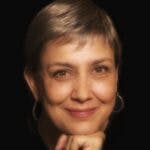Published: 16 October 2017
Last updated: 4 March 2024
We are sitting in Sherman’s Woollahra home in Sydney’s eastern suburbs, surrounded by bold examples of the contemporary art that is so central to her life you could almost call it her religion. But the spiritual is not her domain; instead, Sherman places her faith in the here and now and people realising their potential and finding their purpose, as she has.
‘My father felt that religion should be banished from the world, but he wanted me to know what my heritage was, so he sent me to a Jewish school, the first of its kind for infants in Johannesburg. However, at home, there were no rituals, not even Friday nights. We never went to synagogue but one of his sisters had married a rabbi who was a scholar.
‘At school we were expected to pray twice a day, but I just daydreamed. However, my way into the culture was through language. I loved Hebrew, the look of it was odd and intriguing and I learned it easily back when I was five. Today I can barely utter three words!’ she laughs.
Having rejected the Jewish faith decades ago, today Sherman does not hide her irritation with extreme orthodoxy: ‘I am actively impatient with all those Hassidim in their 16th-century costumes. They make me feel anger and revulsion.’
‘My father felt that religion should be banished from the world, but he wanted me to know what my heritage was, so he sent me to a Jewish school.
Not wishing to deprive her children of traditions, both of her children, Academy Award- winning producer Emile and his sister Ondine, an author and animal rights activist through the Voiceless Foundation, had a bahmitzvah and batmitzvah respectively.
Somewhat sheepishly, Sherman admits that she marks certain holidays - Rosh Hashanah, Yom Kippur and Passover. For her, they have a meaning that transcends religion. ‘I know, it’s not rational,’ she shrugs.
‘In the 70s, we lived around the corner from Temple Emanuel where Rabbi Brian Fox was the first reform Rabbi I had ever met. By then my husband Brian and I had lost three parents early and I felt a need to mark their passing. Ondine attended the Emanuel kindergarten. So yahrzeit became a ritual and for the first time I found the sermons and underpinning philosophy meshed with my thinking. The attitude was non-exclusive, integrated in the world and active in the broader community, which struck a chord with me.’
In the past decade, Sherman has become increasingly connected to Israel by an unexpected twist of fate - the marriage of her daughter Ondine to Dror Ben Ami, an academic and activist. The couple live in Tel Aviv, with their three children. Sherman visits three times a year with her husband, retired financier Brian, who suffers from Parkinsons’s disease. In his youth, the South African-born Brian Sherman had volunteered during the ‘67 war in Israel and stayed on, studying for his accountancy board exams.
More than twenty years ago, Sherman’s first impressions of Israel were not promising.
Always direct, Sherman says ‘I was shocked at how dusty and decrepit it was. But she concedes that ‘A few years later, it had become more sophisticated. Until then she had oriented her extremely cosmopolitan life through her intellectual and aesthetic passions for European (especially French) and Asian (particularly Japanese) culture.
Once Sherman realised that Israel was going to be her daughter’s home, she threw herself into taking an interest in the country the way she does everything: 100 per cent.
‘I plunged into the art scene, which is small, and very soon I knew everyone so I connected people and wrote a few articles about contemporary Israeli art. And then I asked Ondine and Dror to select some causes that we could support. So we donate to a special needs school that our twin ten year old boy grandchildren go to.’
This year, Sherman is responsible for initiating not one, but two exhibitions in Israel. One is a massive undertaking, involving artist Shaun Gladwell, with whom Sherman has a long- standing association, in a multi-media show that commemorates the remarkable story of the 1,000 horses of the 4th Light Horse Brigade and the charge on Beersheva in October 1917.
When it comes to philanthropy her rationale is clear. ‘I am not into Jewish tokenism or ghettos. I don’t discriminate and I don’t favour.
When it comes to philanthropy her rationale is clear. ‘I am not into Jewish tokenism or ghettos. I don’t discriminate and I don’t favour. I think David Gonski and Jim Spigelman, both dear friends, take the same approach. I will advocate for Israeli writers to be invited to the Sydney Writers Festival rather than the Sydney Jewish Writers Festival. For me it is always about chasing quality and about securing the best artistic talent for the best artistic showcase.’
However, her approach to social causes is more nuanced: the Shermans give generously to charities that help the elderly, children and schooling both here and in Israel. At the Emanuel School there is now a Sherman family Art precinct; at the synagogue, they have given money for the kindergarten.
‘I admire the community of which I feel part: valuing education, holding family close, cherishing children, books and learning. I believe in doing unto others as I would have them do unto me and the precept of Tikkun Olam - mending the world.’
Curious, engaged and driven, unconventionally stylish in her signature monochrome black, next year Sherman launches two new initiatives through SCCI, (Sherman Contemporary Culture and Ideas) the latest iteration of her intellectual and artistic passions; in April comes Fashion Hub, a two-week festival of shows, talks and events, followed in October by its architecture-themed twin. Faith may not be part of Sherman’s sense of purpose and conviction, but as she marks her 70th birthday this year, she maintains a high profile and respect in the Jewish and broader community as someone who practises what she preaches.





Comments
No comments on this article yet. Be the first to add your thoughts.